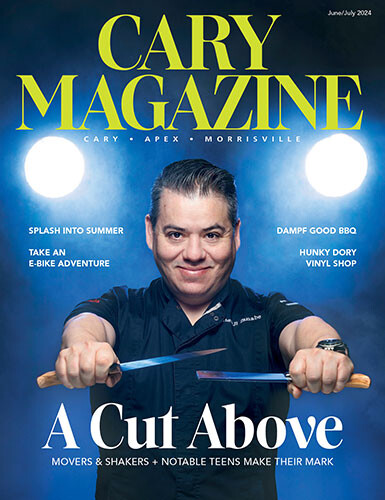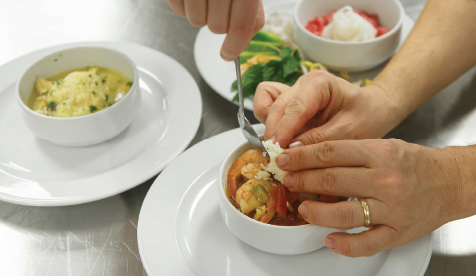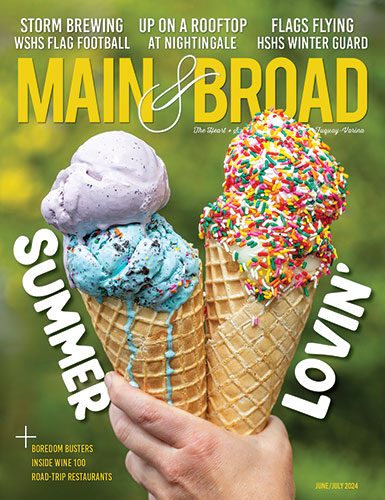For determined career chasers and casual cooks, The Chef’s Academy is dishing up a curriculum from soups to nuts.
One of Morrisville’s tastiest treasures, the academy is a world of shiny stock pots and rows of students in white chef coats, concentrating on cuisine.
“We have students ages 17 to 70,” said academy senior program specialist Ashley Hanslits. “Some are looking to change careers, some are just out of high school, or have even enrolled as a retirement gift to themselves.”
The Chef’s Academy is headquartered in Indianapolis, as the culinary division of Harrison College.
Morrisville was chosen as site of The Chef’s Academy’s second location based on the Triangle’s noted food scene and its thriving community college system, Hanslits says, both assets to academy efforts.
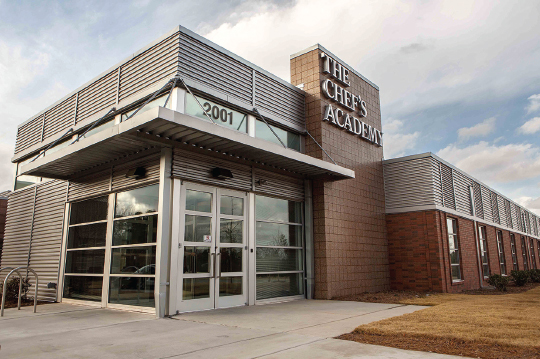
The academy opened here in August 2011, and expects to graduate its first official class of approximately 20 students on March 11. Following 18 months of hands-on and classroom training, and armed with the Associate of Applied Science degree in either Culinary or Pastry Arts, they’ll pursue various careers in the field.
Chef Jeffrey Bane is president of the North Carolina campus, and holds degrees from the prestigious Johnson and Wales University, among others. He’s worked worldwide as a chef, and says the life requires passion, professionalism and hard work, but serving a beautifully crafted meal offers a gratifying “adrenaline rush.”
He and his teaching colleagues pass their experience along to the students.
“We start in the kitchen from day one, and challenge them with an aggressive time frame,” Bane said. “It’s not just recipes; it’s learning how to work in a group, learning the customer and the instructing chef’s thoughts, and deciding what they believe in, as their style.”
Most students attend classes four days a week for five hours each day, and intern- and externships are required.
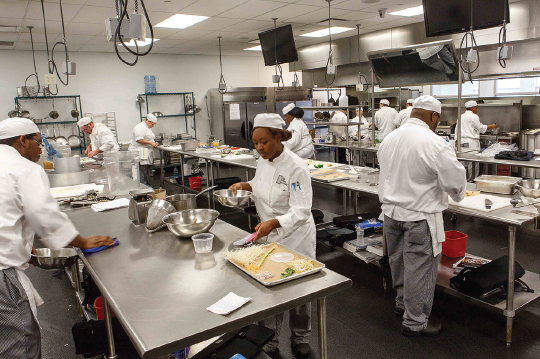
“Work in the field is required for the degree, and for students to get experience in the faster pace of reality,” Bane said. “It all creates a well-rounded chef.”
Students also take part in events such as The Chef’s Academy Chili Cook-Off, and outside volunteer opportunities.
Culinary Arts studies include meats, soups, classical and intercontinental cuisine, menu design, and wine management.
The Pastry Arts curriculum features classes on dough, custards, chocolate artistry and French pastries, among others.
All students study the business side of the food industry, including nutrition, purchasing and sanitation.
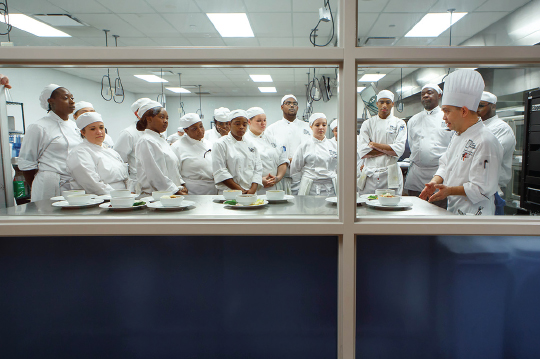
From soup to nuts, The Chef’s Academy is graduating its first class of chefs following 18 months of intense training. For the non-career cook, the academy offers a new three-course Skills Set series for the public, beginning in March.
New Classes for Public
For the person with a passion for the kitchen but who is not seeking a culinary degree, The Chef’s Academy begins a new three-course Skills Set series on March 19, offering classes in knife skills, soups and stocks, and meal preparation. For information, see thechefsacademy.com/food-enthusiasts.
Single classes of a few hours each are also offered to the community, such as a recent wine-food pairing course.
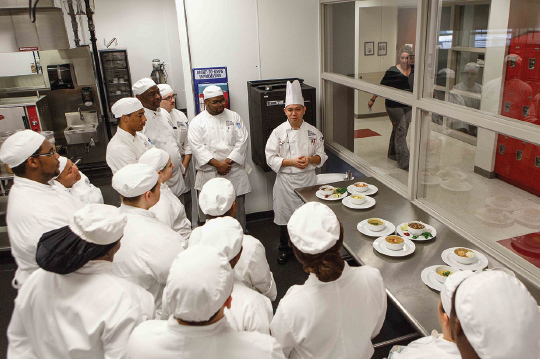
“Don’t be afraid to try, or to take a class,” Bane said. “Skills and recipes are often passed down from generation to generation, and people are usually farther along than they think.
Trust in your natural ability, and ask for help when you need it.
“A plate of food is like a painting, after all; that’s the art of it.”
Chef Jeffrey Bane demonstrates the first lesson students learn at The Chef’s Academy: how to use a knife.
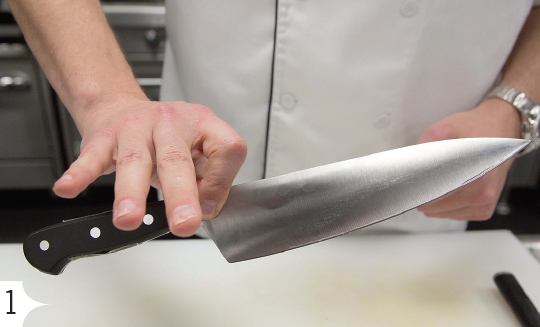
1. Pinch the top of the blade — don’t lay your finger on top of the blade.
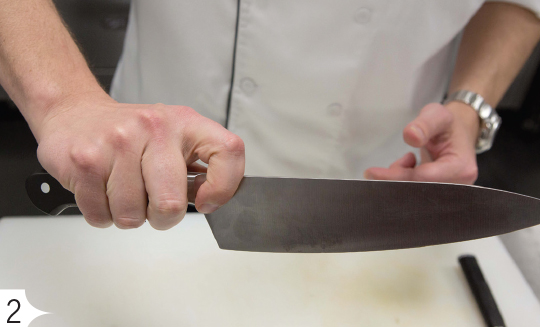
2. Wrap your hand around the knife handle for control of the tool and the blade angle.
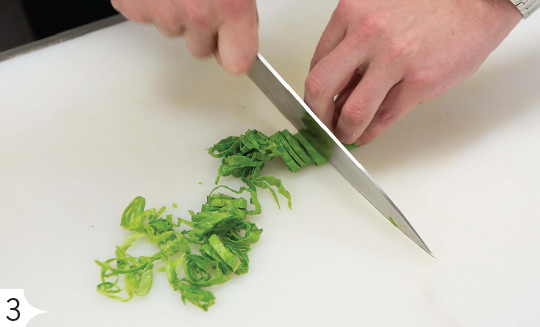
3. Slice using minimal pressure; too much pressure can lead to accidents.
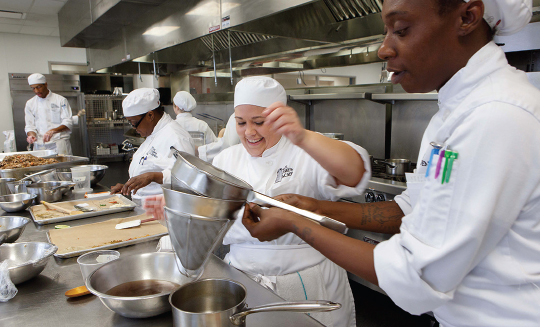
Chef Bane’s Tips:
- Read a recipe all the way through before starting, and decide how to apply it in your kitchen, with your equipment
- Sauté = high heat, always
- Don’t be afraid to try or to ask for help
- It’s OK to substitute ingredients: cumin for coriander, paprika for chili powder
- Use the right knife: It should be longer than what you’re chopping
Food is fun!
Learn more about cooking at classes available locally. Here’s a taste of venues:
The Chef’s Academy, Morrisville
New Skills Set series for the public starts in March; thechefsacademy.com
C’est si Bon! Cooking School, Chapel Hill
Classes for kids, teens and adults; cestsibon.net
Sur la Table, Durham
Technique training and food fundamentals; surlatable.com
Capri Flavors, Morrisville
Appetizer-through-dessert instruction; capriflavors.com
Wake Technical Community College, various campuses
Recent offerings include Korean cooking and Global Street Food; waketech.edu/take-classes-fun
The Market: Restaurant, Grocery & Catering, Raleigh
Coming soon — new partnership with Green Planet Catering. Classes planned on meats, canning, container gardening; eatatmarket.com
